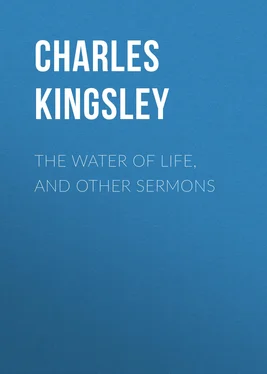Charles Kingsley - The Water of Life, and Other Sermons
Здесь есть возможность читать онлайн «Charles Kingsley - The Water of Life, and Other Sermons» — ознакомительный отрывок электронной книги совершенно бесплатно, а после прочтения отрывка купить полную версию. В некоторых случаях можно слушать аудио, скачать через торрент в формате fb2 и присутствует краткое содержание. Жанр: foreign_prose, foreign_religion, Философия, foreign_psychology, foreign_antique, на английском языке. Описание произведения, (предисловие) а так же отзывы посетителей доступны на портале библиотеки ЛибКат.
- Название:The Water of Life, and Other Sermons
- Автор:
- Жанр:
- Год:неизвестен
- ISBN:нет данных
- Рейтинг книги:4 / 5. Голосов: 1
-
Избранное:Добавить в избранное
- Отзывы:
-
Ваша оценка:
- 80
- 1
- 2
- 3
- 4
- 5
The Water of Life, and Other Sermons: краткое содержание, описание и аннотация
Предлагаем к чтению аннотацию, описание, краткое содержание или предисловие (зависит от того, что написал сам автор книги «The Water of Life, and Other Sermons»). Если вы не нашли необходимую информацию о книге — напишите в комментариях, мы постараемся отыскать её.
The Water of Life, and Other Sermons — читать онлайн ознакомительный отрывок
Ниже представлен текст книги, разбитый по страницам. Система сохранения места последней прочитанной страницы, позволяет с удобством читать онлайн бесплатно книгу «The Water of Life, and Other Sermons», без необходимости каждый раз заново искать на чём Вы остановились. Поставьте закладку, и сможете в любой момент перейти на страницу, на которой закончили чтение.
Интервал:
Закладка:
It stands to reason, my friends, that it should be so. If a man loses his way, and finds it again, he is so much the less forward on his way, surely, by all the time he has spent in getting back into the road. If a child has a violent illness, it stops growing, because the life and nourishment which ought to have gone towards its growth, are spent in curing its disease. And so, if a man has indulged in bad habits in his youth, he is but too likely (let him do what he will) to be a less good man for it to his life’s end, because the Spirit of God, which ought to have been making him grow in grace, freely and healthily, to the stature of a perfect man, to the fulness of the measure of Christ, is striving to conquer old bad habits, and cure old diseases of character; and the man, even though he does enter into life, enters into it halt and maimed; and the wages of his sin have been, as they always will be, death to some powers, some faculties of his soul.
Think over these things, my friends; and believe that the wages of sin are death, and that there is no escaping from God’s just and everlasting laws. But meanwhile, let us judge no man. This is a great and a solemn reason for observing, with fear and trembling, our Lord’s command, for it is nothing less, ‘Judge not, and ye shall not be judged; condemn not and ye shall not be condemned.’
For we never can know how much of any man’s misconduct is to be set down to original, and how much to actual, sin;—how much disease of mind and heart he has inherited from his parents, how much he has brought upon himself.
Therefore judge no man, but yourselves. Search your own hearts, to see what manner of men you really wish to be; judge yourselves, lest God should judge you.
Do you wish to go on as you like here on earth, right or wrong, in the hope that, somehow or other, the punishment of your sins will be forgiven you at the last day?
Then know that that is impossible. As a man sows, so shall he reap; and if you sow to the flesh, of the flesh you will reap—corruption. The wages of sin are death. Those wages will be paid you, and you must take them whether you like or not.
But do you wish to be Good? Do you see (I trust in God that many of you do) that goodness is the only wise, safe, prudent life for you because it is the only path the end of which is not death?
Do you see that goodness is the only right and honourable life for you, because it is the only path by which you can do your duty to man or to God; the only method by which you can show your gratitude to God for all His goodness to you, and can please Him, in return for all that He has done by His grace and free love to bless you?
Do you, in a word, repent you truly of your former sins, and purpose to lead a new life? Then know, that all beyond is the free grace, the free gift of God. You have to earn nothing, to buy nothing. The will is all God asks. Eternal life is the gift of God through Jesus Christ.
Freely He forgives you all your past sins, for the sake of that precious blood which was shed on the cross for the sins of the whole world. Freely He takes you back, as His child, to your Father’s house. Freely, He gives you His Holy Spirit, the Spirit of Goodness, the Spirit of Life, to put into your mind good desires, and enable you to bring those desires to good effect, that you may live the eternal life of grace and goodness for ever, whether in earth or heaven.
Yes, it is the Gift of God, which raises you from the death of sin to the life of righteousness; and if you have that gift, you will not murmur, surely, though you have to bear, more or less, the just and natural consequences of your former sins; though you be, through your own guilt, a sadder man to your dying day. Be content. You are forgiven. You are cleansed from your sin; is not that mercy enough? Why are you to demand of God, that He should over and above cleanse you from the consequences of your sin? He may leave them there to trouble and sadden you, just because He loves you, and desires to chasten you, and keep you in mind of what you were, and what you would be again, at any moment, if His Spirit left you to yourself. You may have to enter into life halt and maimed: yet, be content; you have a thousand times more than you deserve, for at least you enter into Life.
SERMON V
NIGHT AND DAY
The night is far spent, the day is at hand; let us therefore cast off the works of darkness, and let us put on the armour of light.
Certain commentators would tell us, that St. Paul wrote these words in the expectation that the end of the world, and the second coming of Christ, were very near. The night was far spent, and the day of the Lord at hand. Salvation—deliverance from the destruction impending on the world, was nearer than when his converts first believed. Shortly the Lord would appear in glory, and St. Paul and his converts would be caught up to meet Him in the air.
No doubt St. Paul’s words will bear this meaning. No doubt there are many passages in his writings which seem to imply that he thought the end of the world was near; and that Christ would reappear in glory, while he, Paul, was yet alive on the earth. And there are passages; too, which seem to imply that he afterwards altered that opinion, and, no longer expecting to be caught up to meet the Lord in the air, desired to depart himself, and be with Christ, in the consciousness that ‘He was ready to be offered up, and the time of his departure was at hand.’
I say that there are passages which seem to imply such a change in St. Paul’s opinions. I do not say that they actually imply it. If I had a positive opinion on the matter, I should not be hasty to give it. These questions of ‘criticism,’ as they are now called, are far less important than men fancy just now. A generation or two hence, it is to be hoped, men will see how very unimportant they are, and will find that they have detracted very little from the authority of Scripture as a whole; and that they have not detracted in the least from the Gospel and good news which Scripture proclaims to men—the news of a perfect God, who will have men to become perfect even as He, their Father in heaven, is perfect; who sent His only begotten Son into the world, that the world through Him might be saved.
In this case, I verily believe, it matters little to us whether St. Paul, when he wrote these words, wrote them under the belief that Christ’s second coming was at hand. We must apply to his words the great rule, that no prophecy of Scripture is of any private interpretation—that is, does not apply exclusively to any one fact or event: but fulfils itself again and again, in a hundred unexpected ways, because he who wrote it was moved by the Holy Spirit, who revealed to him the eternal and ever-working laws of the Kingdom of God. Therefore, I say, the words are true for us at this moment. To us, though we have, as far as I can see, not the least reasonable cause for supposing the end of the world to be more imminent than it was a thousand years ago—to us, nevertheless, and to every generation of men, the night is always far spent, and the day is always at hand.
And this, surely, was in the mind of those who appointed this text to be read as the Epistle for the first Sunday in Advent.
Year after year, though Christ has not returned to judgment; though scoffers have been saying, ‘Where is the promise of His coming? for all things continue as they were at the beginning’—Year after year, I say, are the clergy bidden to tell the people that the night is far spent, that the day is at hand; and to tell them so, because it is true. Whatsoever St. Paul meant, or did not mean, by the words, a few years after our Lord’s ascension into heaven, they are there, for ever, written by one who was moved by the Holy Ghost; and hence they have an eternal moral and spiritual significance to mankind in every age.
Читать дальшеИнтервал:
Закладка:
Похожие книги на «The Water of Life, and Other Sermons»
Представляем Вашему вниманию похожие книги на «The Water of Life, and Other Sermons» списком для выбора. Мы отобрали схожую по названию и смыслу литературу в надежде предоставить читателям больше вариантов отыскать новые, интересные, ещё непрочитанные произведения.
Обсуждение, отзывы о книге «The Water of Life, and Other Sermons» и просто собственные мнения читателей. Оставьте ваши комментарии, напишите, что Вы думаете о произведении, его смысле или главных героях. Укажите что конкретно понравилось, а что нет, и почему Вы так считаете.












